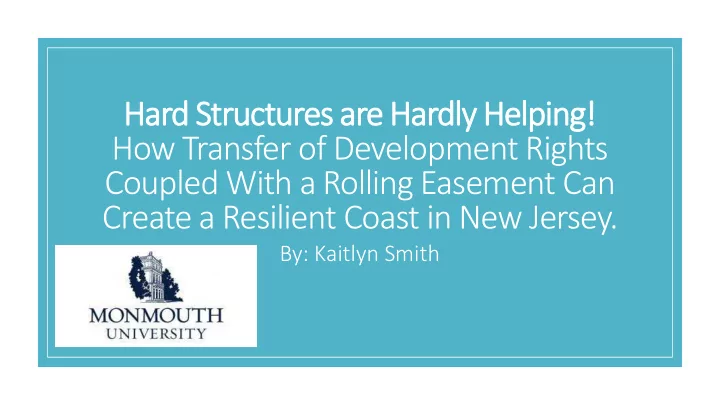

Ha Hard S Structures es are Ha Hardly He y Helping! g! How Transfer of Development Rights Coupled With a Rolling Easement Can Create a Resilient Coast in New Jersey. By: Kaitlyn Smith
I. Coastal climate change impacts Sea level rise Beach stabilization Coastal squeeze Beach nourishment II. Existing legal framework Shore Protection Program Blue Acres program Roadmap: The Coastal Barrier Resources Act State Transfer of Development Rights (TDR) III. Implementing a rolling easement coupled with TDR Texas Open Beach Act Application of rolling easement principles Transfer of development rights (TDR) Program obstacles
Sea-level Rise
Why is sea level rise an issue? $45 BILLION tourist industry Damaged homes Commercial development Wildlife
Beach stabilization SOFT HARD RD
Coastal Squeeze - Squeezes the exposed beach between rising shoreline and development or sea wall.
Beach Nourishment Soft protective mechanism Relocating sand from offshore through dredging Increase beach erosion Impacts to benthic organisms and coastal Long-term not economically feasible
Existing Legal Framework
Goal: To protect coastal communities from erosion, storms, flooding, and sea level rise. Shore Administered by the U.S. Army Corps of Engineers and The Bureau of Protection Coastal Engineering Program Funded: Shore Protection Fund, annual budget of $25,000, 000,00 000 0 towards coastal protection projects. Most is spent on hard 75% state structures and beach 25% grantee nourishment:
Blue Acres Program Implemented in 2007 Designated $300 million towards the buyout of damaged homes in flood- prone areas. Goal to preserve land as open space, accessible to the public. Purchased over 600 properties since Sandy
The Coastal Barrier Resources Act Go Goal: Protect coastal barrier, areas that are biologically rich and are prone to damage from hurricanes and storm surge. Prevents government subsidize from encouraging development Re Result: Only applied to a few places along the New Jersey coast and development has persisted .
State Transfer of Development Rights (TDR)
Proposals
Proposal- background Texas Open Beach Act: Utilizes rolling easements: 1. Prohibits hard shoreline structures. 2. Abandonment of development once the mean high tide has reached it. Preserves beach access and reduces costs.
The Open Beach Act can be used as a template. Application of Ban on hard structures: a program to Rolling remove high-risk existing structures and replace them with soft structures. Easement Funded by the Shore Protection Fund. Principles Less money should be spent on beach nourishment
Coastal retreat enhanced by coupling rolling easements with TDR program The TDR program No direct cost to the The act recognizes that The Tidal zone can be encourages conservation federal government sending areas can be designated as an while promoting because it is supported waterfront property. ecologically sensitive economic growth. only by private funds. area.
Lack of support from coastal communities Florida’s voluntary TDR program has not Obstacles to been as successful as hoped. Implementation Receiving areas are viewed as unattractive to buyers. Complexity of overlaying zoning and regulation frameworks.
The T TDR fr fram amework i is al already Making the establ blishe shed i d in NJ program Eligibi bility w would b d be det eter ermined by d by level o of risk sk: : more Based on, elevation, flood frequency, attractive to distance from the shoreline and areas of critical habitat property Ana Analyze the s he suc uccess o ss of the he progr pr gram, t , the a he acres pr s preser eserved & & owners suc uccess o ss of transfer erred dev evel elopm pmen ent.
Thank you! Contact: Kaitlyn.e.smith@monmouth.edu
Recommend
More recommend